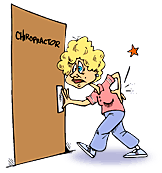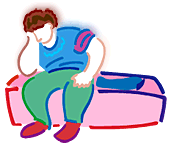
Unsubscribe
Update e-mail address
November 28, 2006 [Volume 7, Issue 25]
To Your Health is brought to you by:
In this issue of To Your Health:
- Sorely in Need of a Chiropractor
- When Fighting Insomnia, Consider Natural Options
- Slow Down and Enjoy Your Food
Sorely in Need of a Chiropractor
 The impact of pain, particularly chronic pain, is far-reaching. It can affect everything from one's day-to-day activities and quality of life to the level of employee productivity at America's most powerful corporations. According to a recent report from the National Center for Health Statistics of the Centers for Disease Control (CDC), approximately one in 10 adults suffers chronic pain lasting at least a year, and one in four reports suffering pain for at least an entire day during the previous month.
The impact of pain, particularly chronic pain, is far-reaching. It can affect everything from one's day-to-day activities and quality of life to the level of employee productivity at America's most powerful corporations. According to a recent report from the National Center for Health Statistics of the Centers for Disease Control (CDC), approximately one in 10 adults suffers chronic pain lasting at least a year, and one in four reports suffering pain for at least an entire day during the previous month.
Adults 18 years and older were instructed to report whether they had experienced any of four types of pain during the three months prior to interview: low back pain, migraine/severe headache, neck pain, and facial ache in the jaw or joint in front of the ear. Respondents were asked to report only pain that lasted an entire day or more, excluding minor aches and pains. Low back pain was the most commonly reported of the four types of pain, the most common cause of job-related disability, and a leading contributor to missed work and reduced productivity. The second most frequently reported chronic pain type was severe headache and/or migraine.
Remember, you don't have to live with pain and you don't have to resign yourself to taking pain medications every day. Chiropractors are experts in managing pain - especially back pain, neck pain and headache pain, three of the most prevalent types of pain reported in the CDC study - without the use of drugs. For more information on the benefits of chiropractic care, visit www.chiroweb.com/find/archives/musculoskeletal.
"Health, United States, 2006." Centers for Disease Control and Prevention, National Center for Health Statistics, November 2006.
When Fighting Insomnia, Consider Natural Options
 Drug-makers have tried to reduce insomnia to a simple message, repeated creatively in TV commericals every day: "Can't sleep? Take a pill. In fact, you deserve it." But according to a recent study, Americans aren't buying the commercials or the drugs these days - they're turning in increasing numbers to chiropractic and other forms of drug-free care to get a better night's sleep.
Drug-makers have tried to reduce insomnia to a simple message, repeated creatively in TV commericals every day: "Can't sleep? Take a pill. In fact, you deserve it." But according to a recent study, Americans aren't buying the commercials or the drugs these days - they're turning in increasing numbers to chiropractic and other forms of drug-free care to get a better night's sleep.
According to the study, an estimated 1.6 million Americans tried alternative health care for insomnia symptoms in 2002. Participants were asked why they chose to use alternative therapies over drugs and other treatments. Sixty-seven percent responded that they thought such options would be interesting to try and 64 percent thought alternative, combined with conventional treatment, would be helpful in treating their insomnia.
The bottom line: If you need a good night's sleep, don't just pop a pill. With all of the side effects that come along with many medications, you might end up sleeping even less. More importantly, however, remember that restful sleep is attributable to a variety of complex factors, including managing anxiety, how much you exercise or watch TV, etc. If you're struggling with insomnia, ask your chiropractor about natural, drug-free ways to get the sleep your body and mind need.
To learn all about chiropractic, visit www.chiroweb.com/find.
Pearson N J, Johnson LL, Nahin R L. Analysis of the 2002 National Health Interview Survey data. Arch Intern Med 2006;166:1775-1782.
Slow Down and Enjoy Your Food
With our eating habits getting seemingly worse by the day and rates of obesity skyrocking, increasing research is investigating possible reasons behind these disturbing health trends.
In a recent study designed to determine how eating speed influences food consumption, 3,737 men and 1,005 women (average age 48 for men, 46 for females) received a physical examination and were weighed, measured and surveyed with an extensive diet/lifestyle questionnaire.
While participants were asked a variety of questions, a single question actually constituted the basis for the entire study: "How fast is your rate of eating?" Subjects could select from five options: very slow, relatively slow, medium, relatively fast, or very fast. Results showed that speed of eating was associated clearly with body weight, and a correlation also was noted between speed of eating and quantity of food consumed. In a nutshell, faster eaters consumed more calories and - no surprise - weighed more, on average.
Talk to your chiropractor about ways you can eat sensibly and maintain a healthy weight. For more information on the health benefits of sound nutrition, visit www.chiroweb.com/find/archives/nutrition.
Otsuka R, Tamakoshi K, Yatsuya H, et al. Eating fast leads to obesity: findings based on self-administered questionnaires among middle-aged Japanese men and women. J Epidemiol 2006;16:117-124.
Unsubscribe
Thank you for subscribing to To Your Health. If you have received this
newsletter in error or wish to unsubscribe, you may remove your name from
our e-mail subscription list at www.chiroweb.com/newsletter/TYH/unsubscribe.php.
Update your e-mail address
To update the e-mail address your newsletter is sent to, click here.
If you have any questions regarding your subscription, please complete this form at www.chiroweb.com/newsletterhelp/TYH.
